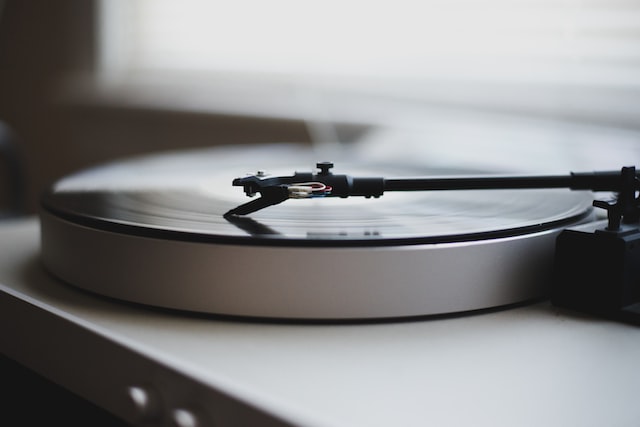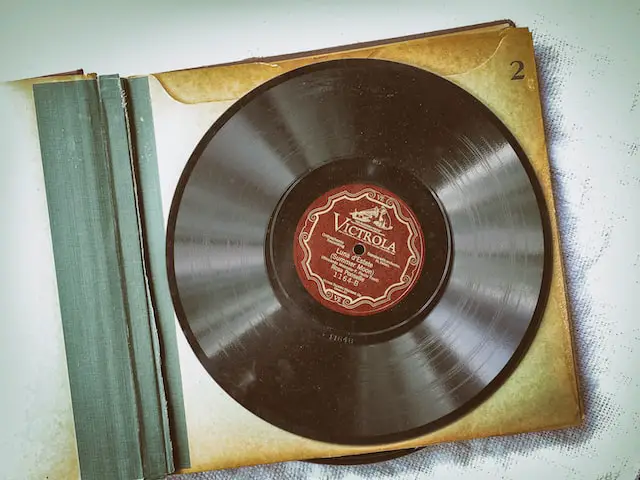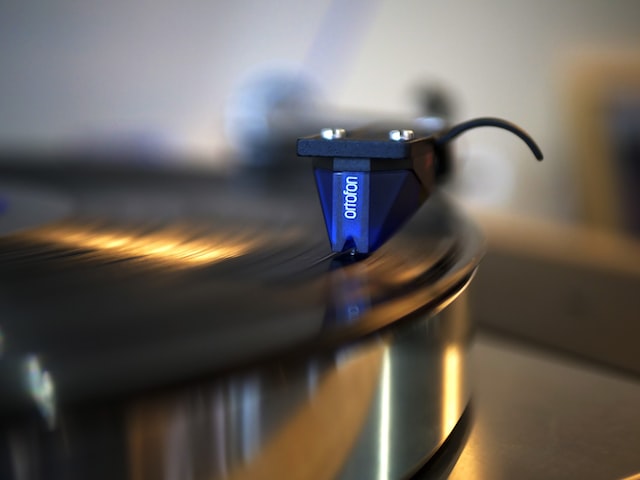Turntables and record players are both great options for playing your favorite music. Turntables offer enhanced sound quality as well as greater control over playback, while record players provide a more traditional listening experience.
What are turntables?
(Photo by Lee Campbell on Unsplash )

Turntables are devices that spin a vinyl record at a constant speed and allow a needle to read the grooves in the record, which produces sound. They typically have a variety of features that can be adjusted to customize the listening experience, including pitch control, which allows the user to speed up or slow down the record; and cueing, which allows the user to start the record at a specific point. Turntables generally require more setup than record players and are more expensive, but they offer superior sound quality.
What are record players?
Record players are musical devices that use a stylus to read vinyl records and convert them into audio signals. A typical record player includes a tonearm, which supports and positions the stylus on the record, and a turntable, which spins the record.
Record players have been around since the late 1800s, and their popularity has waxed and waned over the years. In recent years, however, they have experienced a resurgence in popularity, thanks in part to the rise of retro-chic design trends.
There are several reasons why people might choose to buy a record player instead of (or in addition to) a more modern music playback device such as a CD player or iPod. For one thing, many people appreciate the warm, analogue sound of vinyl records. Additionally, collecting vinyl records can be seen as a hobby in its own right, and playing them on a stylish record player can be a fun way to show off one’s taste in music.
Turntables Vs. Record players – Key differences
Turntables and record players are two different types of devices that are used to play music from vinyl records. Turntables are the traditional type of device that has been used for many years, while record players are a newer type of device that is becoming increasingly popular.
There are several key differences between turntables and record players. Turntables typically have a higher quality sound than record players, as they use a needle to read the vinyl record which results in a more accurate reproduction of sound. Record players, on the other hand, use a belt to rotate the vinyl which can sometimes result in poorer sound quality. Turntables also tend to be more expensive than record players, as they require more maintenance and care. Record players are generally much simpler devices and therefore require less upkeep.
Another key difference between turntables and record players is that turntables can be used for scratching and other DJ techniques, while record players cannot. This is because turntables allow the user to manually control the speed of the vinyl rotation, whereas record players do not. This makes turntables much better suited for DJs and those who want to experiment with their music.
So, in summary, turntables offer superior sound quality but require more care and maintenance than record player; while record players are much simpler devices but don’t provide the same level of sound quality.
Pros and cons of turntables and record players
Turntables and record players both have their own unique set of pros and cons that make them each appealing in their own way. Turntables are typically seen as the more professional option because they offer a higher quality sound and can be used for DJing. Record players, on the other hand, are often seen as being more user-friendly and are a popular choice for people who want to listen to music at home. Below, we’ll take a more detailed look at the pros and cons of each option:
Turntables:
Pros:
- Turntables offer a higher quality sound than record players.
- They can be used for DJing purposes.
- Turntables tend to be more durable than record players.
Cons:
- Turntables can be expensive, especially if you want a high-end model.
- They can be difficult to set up and use if you’re not familiar with them.
- You need to buy separate components (like a needle) in order to use a turntable.
Record Players:
Pros:
- More affordable than turntables
- Often come with built-in speakers
- Less setup and maintenance required
Cons:
- Lower quality sound than turntables
- Limited control over playback
- Not as durable or reliable
Which one should you buy?
If you’re serious about your music and have the budget for it, go for a turntable. If you’re just looking for something to play your records on and don’t care about audio quality, a record player will do the job.
Can a turntable play all records?
Yes, a turntable can play all records. However, a record player cannot play all turntables. A turntable is a type of record player that uses a spinning platter to spin the vinyl record. A record player is any device that can play records.
Do turntables sound better?
Many audiophiles believe that turntables sound better than record players. There are a few reasons for this belief. First, turntables spin the record at a constant speed, while record players spin at varying speeds. This can result in a more consistent sound quality on a turntable. Second, turntables have a direct drive motor, which means that the platter is directly connected to the motor. This allows for more precise speed control and eliminates issues like belt slippage. Third, turntables generally have a higher quality cartridge and tonearm than record players. This results in better sound reproduction. Finally, many people simply prefer the vinyl sound to digital sound.
What is the best type of record player?
1. Portable record players: These types of record players are small and lightweight, making them easy to transport from one location to another. They usually have built-in speakers, so you can listen to your records without having to connect them to an external sound system.
2. USB record players: These types of record players allow you to connect them to your computer via a USB port, so you can transfer your records onto your computer or other digital devices. They typically have higher-quality sound than portable record players.
3. Turntables: Turntables are the traditional type of record player, and they offer the best sound quality. However, they can be more expensive than other types of record players, and they require more setup time.
Can a vinyl record last forever?
(Photo by Mick Haupt on Unsplash )

Though vinyl records are often thought of as delicate and in need of careful handling, with the right storage they can last forever. Proper storage means keeping them away from heat, humidity, direct sunlight, and dust. If you take these precautions, your record should remain in good condition for many years to come.
To further protect your records, you can purchase a special vinyl record storage case. These cases are designed to keep your records safe from the elements and help prevent damage. Whatever storage solution you choose, be sure to handle your records with care to keep them sounding their best for years to come.
Can cheap turntables damage records?
Cheap turntables can damage records because they are not made with the same care and quality as more expensive turntables. Cheap turntables often have lower quality needles that can scratch records, and they may also have less stable platters that can cause warping. In addition, cheaper materials may be used in construction which can lead to unwanted vibrations that damage records. All of these factors can lead to a shorter lifespan for your records when using a cheap turntable.
How much does a good record player cost?
If you’re looking for a good quality record player, you can expect to pay anywhere from $200 to $500. Of course, you can find cheaper options, but the sound quality will suffer. When it comes to choosing a record player, it’s important to consider what features are most important to you. If you’re an audiophile, you’ll want to make sure your player has a good audio preamp and a sturdy construction. If you’re more concerned with portability, then you might want to opt for a lighter model that’s easy to carry around. Ultimately, the best way to figure out how much you should spend on a record player is to set a budget and then shop around for the best deal.
Pros and Cons of vinyl and digital
Vinyl has been making a comeback in recent years as more and more people are rediscovering the warm, analogue sound that can only be achieved with vinyl records. But is vinyl really better than digital?
Here are some things to consider if you’re wondering which format is right for you:
Vinyl Pros:
- Warm, analogue sound
- More engaging listening experience
- Can be played on any stereo system
- Larger selection of music available on vinyl
Vinyl Cons:
- More expensive than digital
- Requires a turntable or record player (and sometimes a preamp)
- Records can be damaged easily
- Takes up more physical space than digital files
Digital Pros:
- More convenient than vinyl
- Can be played on any device with a digital output
- Less physical space required for storage
Digital Cons:
- Sound quality can be lower than vinyl
- Files can be lost or corrupted
Why do people still buy vinyl?
In a word: quality. Vinyl records are made of a durable material that produces a rich, full sound that can’t be replicated by digital formats. That’s why so many music lovers still prefer to buy vinyl records, even though they’re more expensive and less convenient than CDs or MP3s.
There are other reasons why people continue to buy vinyl records, even in the digital age. For some, it’s the ritual of putting on a record and dropping the needle into the groove. For others, it’s the collectability factor – vinyl records are physical objects that can be displayed on shelves and traded with other collectors. Whatever the reason, there’s no denying that vinyl records have a certain appeal that keeps people coming back for more.
Does a turntable need speakers?
A turntable does not need speakers in order to function. However, in order to hear the music that is being played on a turntable, speakers are required. There are two ways to connect speakers to a turntable: via an amplifier or directly into the sound card. If connecting the speakers directly into the sound card, make sure that the sound card has a phono pre-amp built in; if it does not, then an external phono pre-amp will be required.
Featured Image By – Photo by David James on Unsplash








